Queen of Bebop brilliantly chronicles the life of jazz singer
Sarah Vaughan, one of the most influential and innovative musicians of
the twentieth century and a pioneer of women's and civil rights
Sarah Vaughan, a pivotal figure in the formation of bebop, influenced a
broad array of singers who followed in her wake, yet the breadth and
depth of her impact--not just as an artist, but also as an
African-American woman--remain overlooked.
Drawing from a wealth of sources as well as on exclusive interviews with
Vaughan's friends and former colleagues, Queen of Bebop unravels the
many myths and misunderstandings that have surrounded Vaughan while
offering insights into this notoriously private woman, her creative
process, and, ultimately, her genius. Hayes deftly traces the influence
that Vaughan's singing had on the perception and appreciation of
vocalists--not to mention women--in jazz. She reveals how, in the late
1940s and early 1950s, Vaughan helped desegregate American airwaves,
opening doors for future African-American artists seeking mainstream
success, while also setting the stage for the civil rights activism of
the 1960s and 1970s. She follows Vaughan from her hometown of Newark,
New Jersey, and her first performances at the Apollo, to the Waldorf
Astoria and on to the world stage, breathing life into a thrilling time
in American music nearly lost to us today.
Equal parts biography, criticism, and good old-fashioned American
success story, Queen of Bebop is the definitive biography of a hugely
influential artist. This absorbing and sensitive treatment of a singular
personality updates and corrects the historical record on Vaughan and
elevates her status as a jazz great.

